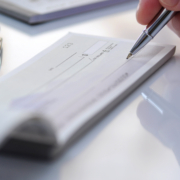Business Impersonation New Account Fraud Targets Wisconsin Banks
 By Dave Oldenburg
By Dave Oldenburg
With mail theft at an all-time high, bad actors continue to cash in on check fraud. Organized criminals take mail from blue USPS collection boxes, or businesses that have unsecured mailboxes, looking for checks, which are used to deposit to fraudulent accounts and withdraw available funds quickly.
After the checks are stolen, fraudsters “impersonate” the business listed as the payee by fraudulently registering the business with the Wisconsin Department of Financial Institutions. The fraudulent registration is used as documentation to open a new account.
This type of fraud continues to gain traction because legitimate high-dollar checks are pilfered and deposited into an account without having to alter checks — a strategy designed to throw off suspicion.
Common Tactics
- The fraudster may park or is dropped off near the branch to avoid vehicle identification.
- The person opening the account may provide two forms of identification (later determined to be counterfeit) such as an out-of-state driver’s license and a passport identification card.
- The person will furnish a copy of a utility, cable, or mobile phone bill that lists a local address.
- The person opening the account may not deposit the stolen check right away to avoid scrutiny.
Possible Red Flags
- Internet research shows that the business operates out of state.
- Internet research cannot support a connection to Wisconsin.
- The registered agent’s address is outside the geographical area where the business operates.
- Recent and/or multiple business registrations for the same person are listed with the Wisconsin Department of Financial Institutions. Based on the number of stolen checks in their possession, fraudsters may register multiple businesses around the same time.
- The name of the business differs slightly from the payee listed on the check or is a variation of a larger, well-known corporation.
- The signer seems rushed or provides vague information about their business.
Best Practices and Procedures to Prevent Losses
- Consider additional due diligence on new business deposit accounts that were recently registered. A quick Google search will often reveal that the business operates out of state and has no affiliation with the registered agent, or the address they provided.
- Double check for signs of fake or altered identification.
Because there are variations of business impersonation new account fraud, it is best to follow your institution’s best practices and procedures regarding suspicious activity.
Oldenburg is vice president – director of financial investigations at Tri City National Bank, West Allis, and member of the 2023–2024 WBA Financial Crimes Committee





